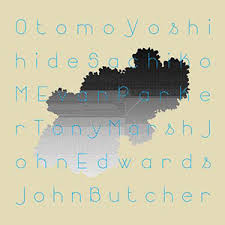Something amazing and awful happened this week. Hitting a junction by foot on my way home with Otomo Yoshihide’s newest LP Quintet/Sextet in ear, a clearly rabid wildebeest-dog and its toothless, pitted twin stared long into my soul and let out a harrowing war cry. I’d never known barking – or glaring – so morbid and purposeful. Had the owner of Dalston’s worst beasts not yanked so viciously at their chained necks, knocking chunks of diseased, coleslaw-like slop from the pair’s fettered gums, they would have torn me apart and swallowed my bones.
But what made the scene so much more shocking was its soundtrack. The album – its title snatched from the Miles Davis archive, given to a collaborative project with Milt Jackson – was performed during the last night of a brief residency Yoshihide shared with cult sine wave manipulator Sachiko M at Hackney’s Cafe Oto back in 2009. Even in the opening bars of track one of four, which sees Yokohama-born guitarist Yoshihide evoking the hopeless drones of nuclear fallout through hushed harmonics while John Butcher blasts quavering discordance from his saxophone, Quintet/Sextet is a complete nightmare.
Their coming together was long in the pipeline after the pair made album Good Morning Good Night with circuit bending mentalist Toshimaru Nakamura. Aside from his prolific output and partnerships with the likes of Jon Rose, Junji Hirose and Evan Parker, who joined Butcher on sax for the series’ final showcase, Yoshihide has spent over twenty years soundtracking films about China’s communist revolution and all the militarism, heartache, triumph and love loss it entailed. One in particular, 1993’s The Blue Kite, is a trio of tales following the life of a young boy resisting – and being constantly terrorised by – Mao’s forces. Yoshihide’s score is characteristically playful, thick and resounding; plucking, prodding, clanging at strings like a baby slapping cot bars.
Like Yoshihide’s strung out reverb, Sachiko’s work plays on long stretches of signal resonance, and their twelve minute duel of a track, the record’s second, broods in its near silence. As a younger, Yoshihide’s engineer father taught him how to build radios from wire strands, spurring his interest in hand-made oscillators. Final track ‘Sextet’ sees Yoshihide pummel ten shades of rheumatic dystopia out of his Byrdland while Parker pops veins scraping the circular breathing soprano’s wiliest course. Beat slinger Tony Marsh – known for his work as part of improv-rock jazz ring Major Surgery in the 70s – pioneered a set-up of hanging cymbals and horizontal bass drums until his death two years after the performance, in 2012. In sum, the six of them – conductor Yoshihide, Sachiko, Parker, double bassist John Edwards, Marsh and Butcher – paint a perfect picture of purgatory.
<div class="fb-comments" data-href="http://thequietus.com/articles/15720-otomo-yoshihide-quintet-sextet-review” data-width="550">


